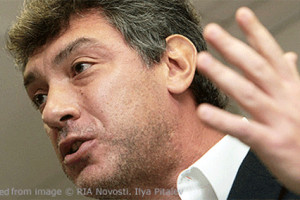Nemtsov’s Murder Defines Putin’s Russia

(Bloomberg editorial – bloomberg.com – March 1, 2015)
The thousands who marched in Moscow on Sunday in honor of the murdered opposition politician Boris Nemtsov did so because they recognize just how much has been lost with his death. Nemtsov had been brave enough to tell the truth in Russia under President Vladimir Putin.
The official response to his apparently professional murder on Friday, in the shadow of the Kremlin, has been distasteful. Government spokesmen have spun tales of conspiracy — involving Islamists or Nemtsov’s fellow opposition leaders — to distract from the most plausible explanation: that Putin and his obedient state news media have created an atmosphere of hatred that encouraged such violence.
Putin has announced an investigation, and he should be encouraged to follow through. Given the record of assassinations of inconvenient figures, however, it’s hard to hope for a truthful reckoning. The journalist Anna Politkovskaya, chronicler of Russia’s descent into autocracy under Putin, was shot in her apartment foyer in 2006; former Russian intelligence officer Alexander Litvinenko was poisoned a month later in London, after writing that the security agencies arranged the 1999 apartment bombings that triggered the second Chechen war and vaulted Putin to power; Sergei Magnitsky, an accountant who alleged official tax fraud, died in custody in 2009.
There is no evidence the Kremlin ordered Nemtsov’s killing, and it would have as much to lose as to gain from such a public execution on one of the most closely surveilled sidewalks in Russia. Nevertheless, since Putin returned to the presidency in 2012, he has systematically stirred up hatred for his political opponents, tarring men such as Nemtsov as members of a treacherous “fifth column.” Most recently, pro-Kremlin legislator Dmitriy Sablin joined in creating the so-called Anti-Maidan movement, which brings together ultra-nationalists, Communists and a Hells-Angels-style motorcycle gang to counter opposition protests. The government has also licensed Russian nationalists and the security services to pursue a covert war in Ukraine, a connection Nemtsov was threatening to expose with a report on the Russian soldiers fighting and dying there.
Indeed, the most frightening interpretation of the liberal politician’s death is that the alliance of security service officers and ultra-nationalist thugs Putin has unleashed is now beyond his control.
Nemtsov’s death may not change things in Russia; much of the population appears to be caught up in a nationalist fervor. But outside the country, perhaps it can end any illusions that Putin’s toughness is somehow a trait to be admired. He has taken Russia back to an old and discredited form of government.
Article ©2015 Bloomberg L.P. All Rights Reserved. Article also appeared at bloombergview.com/articles/2015-03-01/nemtsov-s-murder-defines-putin-s-russia
